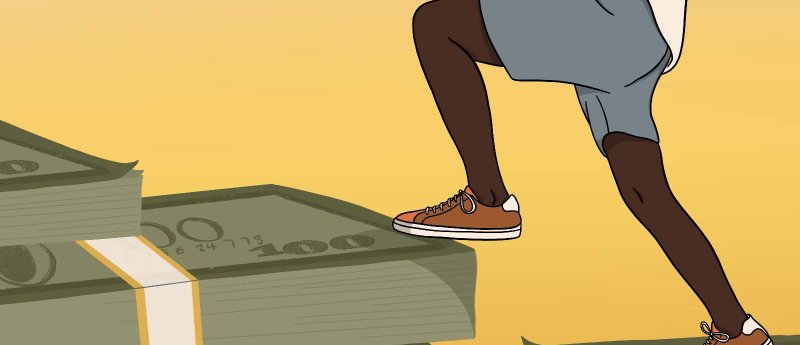Fostering Cross-Sector Collaboration to Improve Well-Being
Fostering Cross-Sector Collaboration encourages people to see the connection to health and well-being within their work, whether in education, transportation, community development, law enforcement, business, or other fields. Improving population health requires shared investments, mutually beneficial policies, and innovative partnerships that recognize the importance of well-being for all.
-
Turning research into actionWho Benefits from Blanket Student Loan Forgiveness?
The media is replete with articles speculating about President Biden’s across-the-board student loan debt relief plans, given that federal student loan debt exceeds $1.6 trillion spread across 43 million borrowers, according to the Federal Student Aid portfolio summary for 2022. These plans for broad-based forgiveness extend beyond the existing pause on student loan payments implemented through COVID-19 emergency relief, Public Service Loan Forgiveness Program waivers, and forgiveness for borrowers defrauded by for-profit institutions and borrowers with disabilities.
August 18, 2022
|P4A Spark
| -
HousingGentrification and Opportunity Zones: A Study of 100 Most Populous Cities with DC as a Case Study
Opportunity Zones (OZ) were implemented by the federal government and some state and local governments in 2017 to attract new investments to distressed communities in urban and rural areas in the United States. The program offers tax incentives to private businesses for investing in OZ designated neighborhoods.
April 1, 2022
|Evidence
| -
The US is experiencing a housing affordability crisis. Families that lack access to safe, affordable and stable housing face increased risk of eviction, especially in cities, where the rent burden is most severe. Research suggests that evictions worsen material hardship, can force families into lower-quality housing in more disadvantaged neighborhoods, and erode mental health.
January 6, 2022
|Evidence
| -
Turning research into actionNew Insights on How Philanthropy Can Improve Community Health
The health and well-being of people are intimately tied to the conditions of life in their communities—conditions that structure opportunities and pathways for lifelong and even inter-generational well-being. Philanthropic efforts to improve community health must attend to the many systems that shape life conditions by focusing not only on whom, what, or where to fund, but equally importantly, on how to fund. The Urban Institute’s recent comprehensive review of health-focused community development investments made by the Robert Wood Johnson Foundation between 2013 and 2019 yielded a wide range of insights about how philanthropic investments can drive enduring systems change needed to improve community health, well-being, and equity across the nation.
October 1, 2021
|P4A Spark
| -
 Turning research into actionWhy Building Black Wealth is Key to Health Equity
Turning research into actionWhy Building Black Wealth is Key to Health EquityDarrick Hamilton, the Henry Cohen Professor of Economics and Urban Policy at The New School, has gained national recognition for shaping policy solutions to close the racial wealth gap, which refers to how hundreds of years of structural racism have deprived Black families of resources that accumulate and transfer from one generation to the next. The typical White family has 10 times the wealth of the typical Black family and seven times the wealth of the typical Latinx family. This stark and persistent racial wealth gap has harmed generations, driven disparities and appears to be growing, even after controlling for household characteristics and long-term education and income gains by Black people.
September 16, 2021
|P4A Spark
| -
Children and FamiliesShort-term effects of the earned income tax credit on children's physical and mental health
Childhood poverty is associated with worse health outcomes, including poor physical and cognitive development, and can adversely influence social and health outcomes in later life. While there is increasing interest in policies to address childhood poverty, limited research exists on whether current U.S. poverty alleviation policies, including the largest such program, the Earned Income Tax Credit (EITC), improve children's health.
June 1, 2021
|Evidence
| -
 Turning research into actionA New Era Built on Actionable Policy-Oriented Evidence
Turning research into actionA New Era Built on Actionable Policy-Oriented EvidenceTwo pandemics upended our nation this year. The novel coronavirus (COVID-19) continues to sicken, kill, and reshape the lives of people everywhere, and is also testing our nation’s healthcare, public health, education, and social protection systems like never before. The second pandemic is one that has been with us since well before our nation’s founding but has come into much sharper focus this past year. Like a virus, it has infected virtually every aspect of our society including our laws and policies, a central focus of the Policies for Action (P4A) research program: systemic racism and its attendant social, economic, and political injustices. Although this time last year, the need for sound policy research was clear – especially in light of growing inequality in health and wealth, and the conditions that drive and are shaped by these – 2020 made these needs more visible and more urgent. As P4A enters its sixth year, a strong and growing community of policy researchers across the country, supported by a stellar National Advisory Committee, are generating a host of research findings crucially needed at this moment.
January 29, 2021
|P4A Spark
| -
 Turning research into actionIncome support programs do more than reduce income inequality—they also save lives and promote health equity
Turning research into actionIncome support programs do more than reduce income inequality—they also save lives and promote health equityTo help people make ends meet, the United States offers a set of income supports for families with low-incomes, children, seniors and people with disabilities. Recent research from Policies for Action found these income support programs do more than reduce income inequality—they also save lives and promote health equity, particularly for women and children.
December 14, 2020
|P4A Spark
| -
Our homes and neighborhoods have a powerful impact on our physical and mental health, with the potential to exacerbate chronic and acute health problems and cost the U.S. billions of dollars annually. Sherry Ahrentzen and Lynne Dearborn investigated how the Low-Income Housing Tax Credit (LIHTC), the nation’s largest source of funding for the development and preservation of affordable rental housing, can contribute to shaping a healthier housing stock.
December 1, 2020
|Evidence
| -
Income and WealthShort-term effects of the earned income tax credit on mental health and health behaviors
Building on prior conflicting studies in the International Journal of Epidemiology and the American Journal of Epidemiology, researchers Daniel F. Collin, Laura S. Shields-Zeeman, Akansha Batra, Anusha M. Vable, David H. Rehkopf, Leah Machen, and Rita Hamad evaluated seasonal variation in the health effects of the EITC among U.S. adults in this study published in Preventive Medicine.
October 1, 2020
|Evidence
| -
Children and FamiliesThe Long-Term Effects of Childhood Exposure to the Earned Income Tax Credit on Health Outcomes
The Earned Income Tax Credit (EITC) is one of the largest safety net programs in the United States. In 2019, the EITC reached 25 million tax filers at a total cost of $63 billion. Using variation in the federal and state EITC, Breno Braga, Fredric Blavin and Anuj Gangopadhyaya evaluated the long-term impact of EITC exposure during childhood on the health of young adults.
September 14, 2020
|Evidence
| -
Many public and subsidized housing developments in the U.S. are aging and in need of significant repairs. In a new article in Health Affairs, Ingrid Gould Ellen, Kacie L. Dragan, and Sherry Glied from the P4A Research Hub at New York University Robert F. Wagner Graduate School of Public Service, study the impact of a recent renovation and transfer program of public housing in New York City on the health and well-being of residents.
February 1, 2020
|Evidence
|